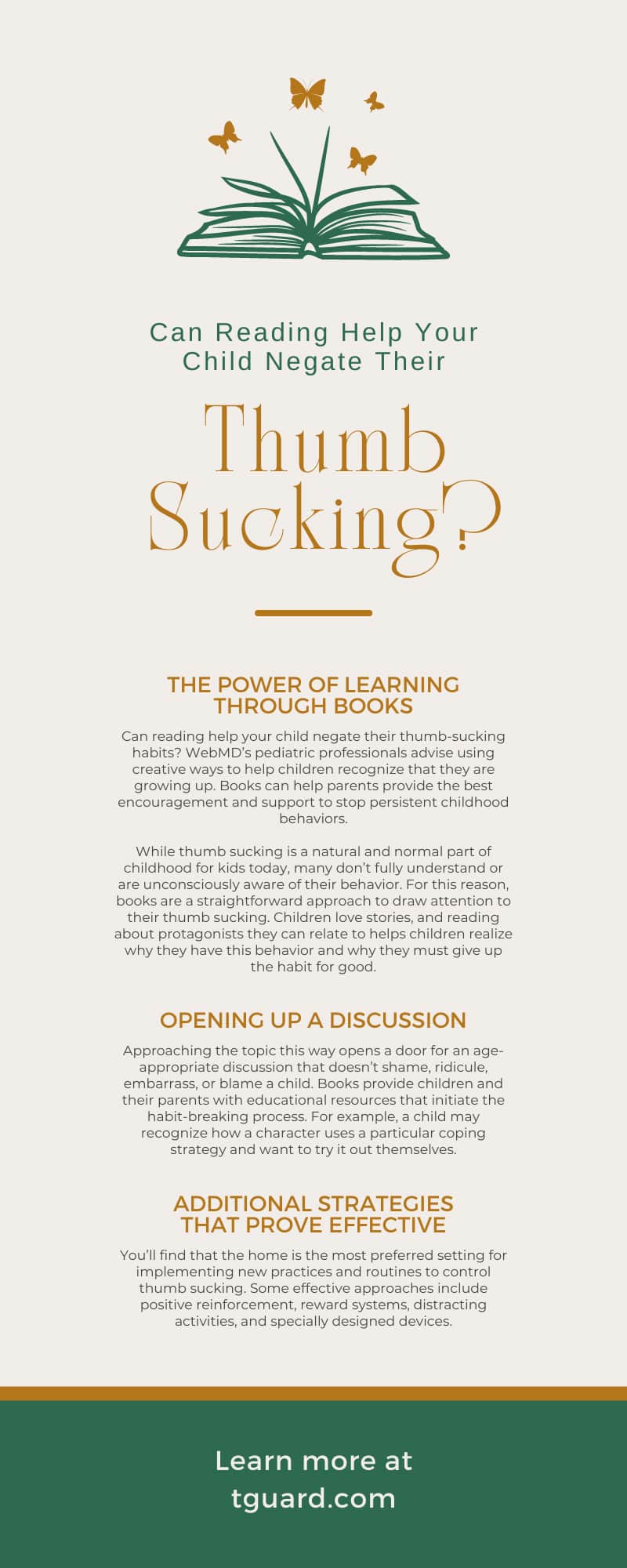Thumb sucking is a common self-soothing behavior among children during early childhood development. While the practice is a natural reflex for babies and toddlers, sucking becomes a concerning matter with increased age and intensity. As prevalent non-nutritive sucking behaviors become a frequent or prolonged habit, concerned parents often wonder about the best avenue to take to prevent the dangers of thumb sucking.
With a wide array of tailor-made resources and devices available, the right strategy for addressing the routine behavior depends on the child in question. Age-appropriate conversations and self-awareness through learning might support the process.
Can reading help your child negate their thumb sucking? Reading a book with a narrative regarding the topic can help a childtransition to a stress-relieving technique that doesn’t harm their growth or well-being. Let’s take a closer look at this activity and how a targeted strategy with supplementary resources can help kick the habit for good.
The Importance of Breaking Childhood Habits
A habit is a practice that some individuals aren’t consciously aware that they’re doing. As dedicated children’s advocates recognize, “Children are creatures of habit who take comfort in the familiar—for better or worse.”
Akin to adults, children’s habits can disappear by themselves over time, but the challenge lies in developmental-related behaviors that are harmful when persisted or intensified. At this time, proactive parental intervention should occur to address the behavior that poses a risk to their child’s health. Thumb sucking becomes a source of concern once a child’s permanent teeth begin to come in, generally after the age of 5.
Potential Developmental Setbacks and Consequences
Most childhood habits are phases of normal development that generally fade away with time. But for some, thumb sucking won’t disappear on its own. Unfortunately, the long-term effects of digit sucking can lead to oral, social, and emotional development issues or other health problems.
As children age, thumb sucking has potentially serious consequences when left untreated, including recurrent illness, malocclusion, and social isolation. The main concern is their continuously growing bodies. According to the American Dental Association, the intensity of the sucking determines the resulting problems. A frequent or prolonged thumb sucker leaves a lasting impact on their mouth, teeth, and jaw. These effects may require costly dental work and cause prevailing self-esteem issues in the future.
The Essential Role of Parents for Guidance and Support
Babies and infants naturally find the sucking sensation to be a remedying experience. Yet, after entering their preschool years and beyond, children have reached a stage of development where they can self-soothe without those reflexive rooting and sucking behaviors. All they need is the right support and alternative practices.
Parents with dedicated thumb suckers play a critical role in phasing out the behavior and overcoming the habit. Child development professionals identify mother and father figures as the key to stopping or reversing common dilemmas associated with non-nutritive digit sucking.
Finding a Solution: The Next Steps To Take
Helping a child transition from thumb sucking to a healthier stress-relieving or self-soothing technique isn’t necessarily an easy process. However, the effort is worth the time and energy to avoid damage to their bite, jaw development, or teeth alignment. The goal is to pinpoint the underlying cause of the habit, identify the best solution, and provide the necessary guidance and encouragement moving forward.
Parents who talk with their children and have them involved are more likely to be successful in halting the habit. The process is much easier once a child understands or realizes their behavior. As the parenthood experts at Healthline note, parents are the ones who know their children best. Those who feel that their child needs an extra push or guided intervention can turn to a variety of helpful products, including educational books.
The Power of Learning Through Books
Can reading help your child negate their thumb-sucking habits? WebMD’s pediatric professionals advise using creative ways to help children recognize that they are growing up. Books can help parents provide the best encouragement and support to stop persistent childhood behaviors.
At local libraries, bookstores, or online storefronts, parents can find dedicated books on the subject that provide support and encourage an open discussion about giving up a habit. If your child enjoys reading or storytelling sessions, the stories and characters in these books will provide educational information through a relevant narrative.
While thumb sucking is a natural and normal part of childhood for kids today, many don’t fully understand or are unconsciously aware of their behavior. For this reason, books are a straightforward approach to draw attention to their thumb sucking. Children love stories, and reading about protagonists they can relate to helps children realize why they have this behavior and why they must give up the habit for good.
Opening Up a Discussion
Approaching the topic this way opens a door for an age-appropriate discussion that doesn’t shame, ridicule, embarrass, or blame a child. Books provide children and their parents with educational resources that initiate the habit-breaking process. For example, a child may recognize how a character uses a particular coping strategy and want to try it out themselves. Or a book may offer insight into harmful habits as a whole and outline why they are difficult to break.
Either way, reading has the potential to neutralize thumb sucking. Talking and reading along with your child also delivers an opportunity to recognize the power of habits while identifying further treatment strategies that may work.
Additional Strategies That Prove Effective
Concerned parents should examine their child’s situation carefully to determine the best solution for success. You’ll find that the home is the most preferred setting for implementing new practices and routines to control thumb sucking. Some effective approaches include positive reinforcement, reward systems, distracting activities, and specially designed devices.
Try TGuard: The AeroThumb
The AeroThumb is a clever device that takes the pleasure out of sucking by preventing suction from forming. Dental professionals recommend our ergonomic thumb guard to break the habit with speed and efficiency due to its comfortable, durable, flexible, and non-restrictive nature. Read through success stories or learn more about our treatment kit on our website.
Sources:
“Help Your Child Say Good-Bye to Bad Habits” from The Children’s Trust
“How to Help Your Kid Kick the Thumb-Sucking Habit” from Healthline
“9 Ways to Wean a Child off Thumb Sucking”from WebMD
“Thumbsucking and Pacifier Use” from the American Dental Association






